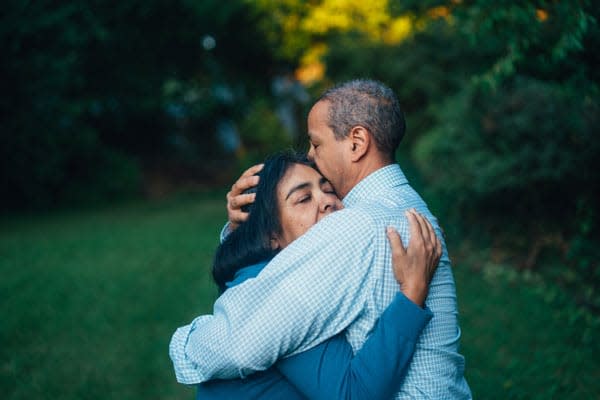My Husband And I Both Have PTSD After The Death Of Our Child — But It Manifests In Very Different Ways
Trigger warning: vivid descriptions of child loss/PTSD
My husband went to the doctor a couple of years ago, and when he came home, he told me that he had been diagnosed with PTSD. It wasn’t surprising, not really, especially as someone who was diagnosed with PTSD not long before him and easily recognizes the signs of such a disorder — flashbacks, bad dreams, agitation, social isolation, mistrust, etc.
And my, oh my, did he ever have these symptoms.
You see, our four-month-old daughter died suddenly and without reason a few years ago. After a completely normal weekend, I woke up the next morning to find my baby laying gray, unresponsive, and with a bloody nose (a normal occurrence for babies who have died from SIDS). 9-1-1 was dialed, CPR was performed, but my husband and I fought a losing battle.
With each chest compression, more and more blood was pooling in and out of her little mouth, and before the first responders ever walked through my door, her tiny, perfect hand was already growing cold. Even if I couldn’t bring myself to accept it in that moment, I knew in my heart of hearts that my baby was already gone.
By the time we had reached the hospital, it didn’t take more than ten minutes before the ER doctor said those words no parent can fathom hearing. It was all just so… traumatizing. So painstakingly traumatizing.
More than anything else that haunts me from my daughter’s passing, it’s the repetitive images from that morning. The blood, her laying lifeless, first responders accidentally breaking her ribs while trying to resuscitate her, and my husband crying out like I’d never seen before… sometimes, even still, it’s all just too damn much.
There are no words which could adequately express the heartbreak, shock, and trauma of that morning. Trying to comprehend how someone so perfect and innocent could be alive one moment and gone the next felt like I had failed her as a mother. Like her life had slipped right through the gaps in my fingers, and I know my husband felt the same way as her father.
From the very beginning, he and I have grieved in opposite ways. In the trauma room of the ER, I curled up on the hospital bed with her, pressing my body against the weight of my daughter’s, tracing her face with my fingertips, and kissing her cheeks over and over again gently. Meanwhile, he was crouched in the farthest corner of the room sobbing in a way that I will never forget. I can still see him crying out, “No! Not my baby! Not my baby! Not my baby!”

It crushed me.
He desperately wanted to leave the hospital ASAP, folding into his “flight” response of the trauma, but I couldn’t stand the sight of our house’s four walls. He stored our daughter’s baby swing and car seat in our basement the following day without asking me first, and though I tried respecting his own grief by letting him have his way, I just… wasn’t ready. His response to our daughter’s death has been to lock away her memory so deep that even he can’t find the key, but I find immense gratitude in remembering my baby.
We have the same diagnoses of PTSD for the exact same reasons, but they might as well be worn through contrasting colors. My disorder causes me to feel tremendous, sometimes irrational, fear over the unknown, and he feels great rage over what is done. Even years later, I need to talk about my daughter’s death so my brain can process this tragedy, but he’d rather I didn’t mention her name in his company.
To put it simply, our relationship isn’t the same anymore, and it shatters every part of me. We struggle to find a happy medium when it comes to our daughter, so the result is that we do not grieve together at all… and in truth, this just doesn’t feel like how it should be.
He is the only person on this earth who knows what it was to lose her, the trauma of that morning, and how it’s been to live every day since then. Yet, he is the only person who refuses to talk about her. He lashes out in anger, saying unspeakably horrible things to the people he loves the most, with me being the one taking the brunt of the load. While I try to be understanding, loving, and compassionate for the sake of his well-being, I often find myself asking, what about me?
I’ve tried helping him for years without acceptance, and I struggle to live in a household where it feels like, between us, our daughter didn’t exist.
I see him wake up from bad dreams, those terrible awful ones, and I’m beside him when one of our babies is sleeping “too” soundly, causing him to rush over to them in panic. Throughout it all, without him saying a word, I know the demons he is battling… and I wish he felt safe talking to me.
This anger, irritability, and restlessness he feels is a blindfold to an even bigger issue, I know that. But that doesn’t mean I can’t miss him. I miss the man he was before he was met with the one thing in life he will never be able to fix. I miss him just as much as he misses the woman I used to be before this loss altered me. We miss each other and the couple we used to be.
Above all, I miss the days when we didn’t have PTSD.
